On today’s global call, we heard the 30 organizations in the MCLD Associaion in Nigeria, known as Strategy Action for Community Development – SACD-Nigeria, conducted a successful campaign across 13 states of the country, reaching 1 million people directly and 10 million through the media. As they report, “we saved lives.”
Introduction
Nigeria’s 2023 presidential and National Assembly Election was held on 23rd February 2023 while the state Governorship and State House of Assembly Election was held on the 18th March 2023 across 36 States and 774 Local Government Areas in Nigeria.
Since the Independence era, elections in Nigeria have been characterized by the high scale of electoral malpractices, money politics, electoral violence, and the use of ethno religious divide to influence the voting patterns of the electorates. Electoral violence is one of the strategies employed by Nigerian politicians during the electioneering period. Desperate and power-drunk politicians often sponsor unemployed youths and stark illiterates to carry out assaults on their perceived political opponents to manipulate election results to their own advantage.
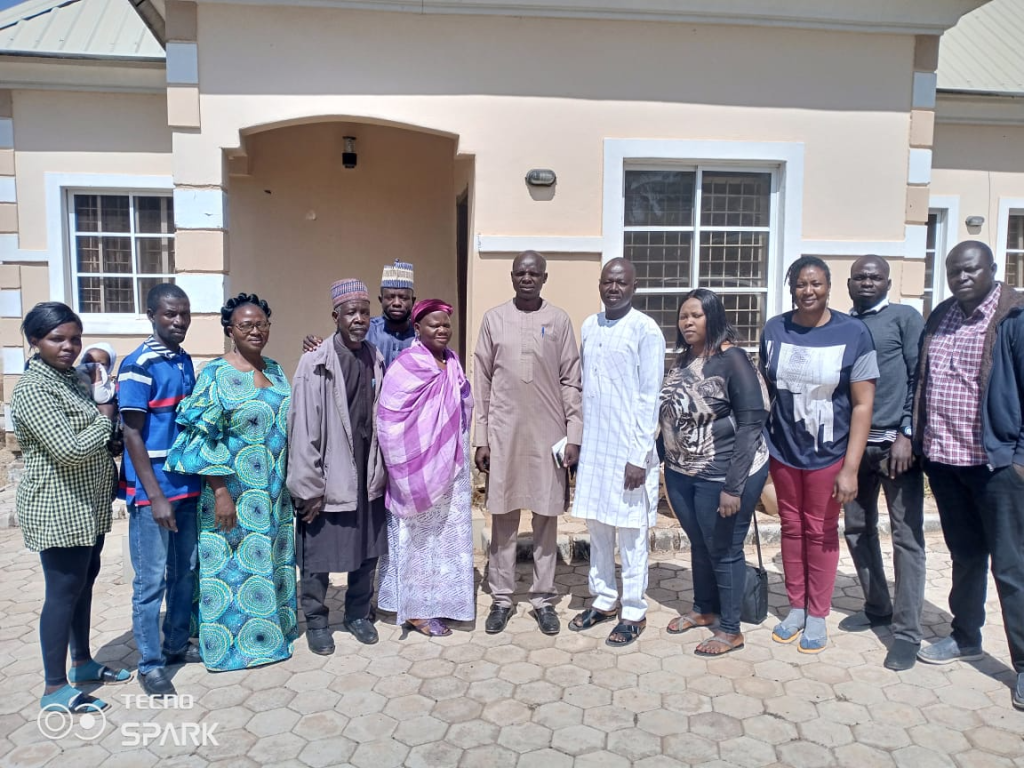



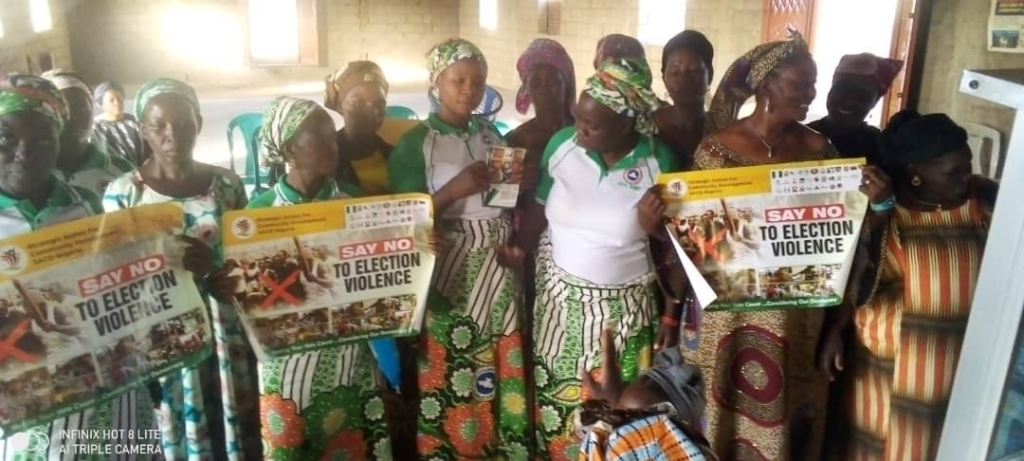
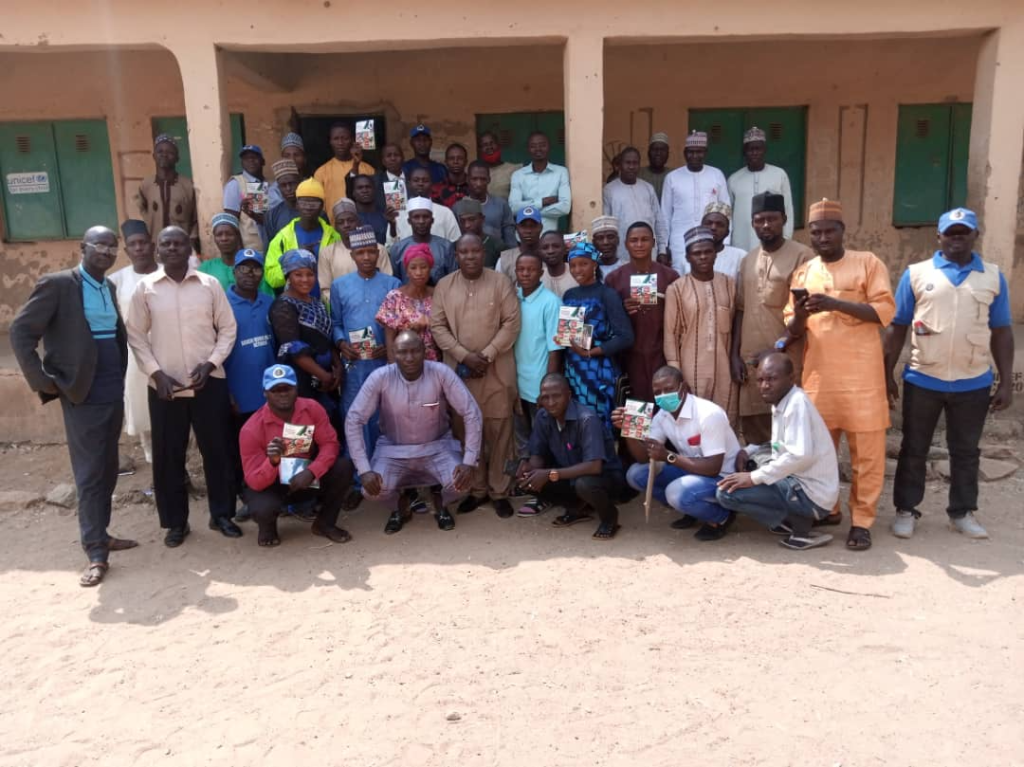
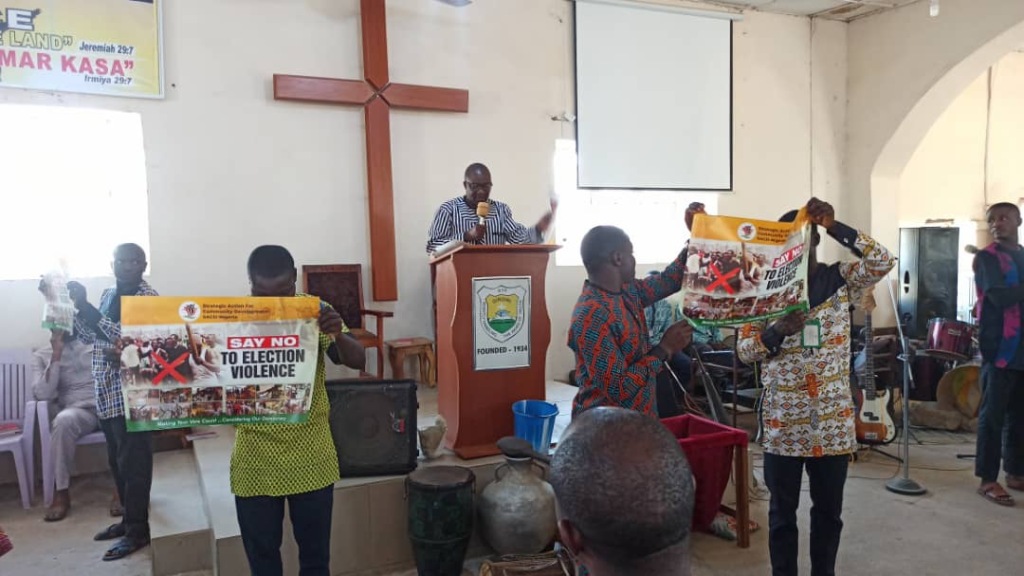

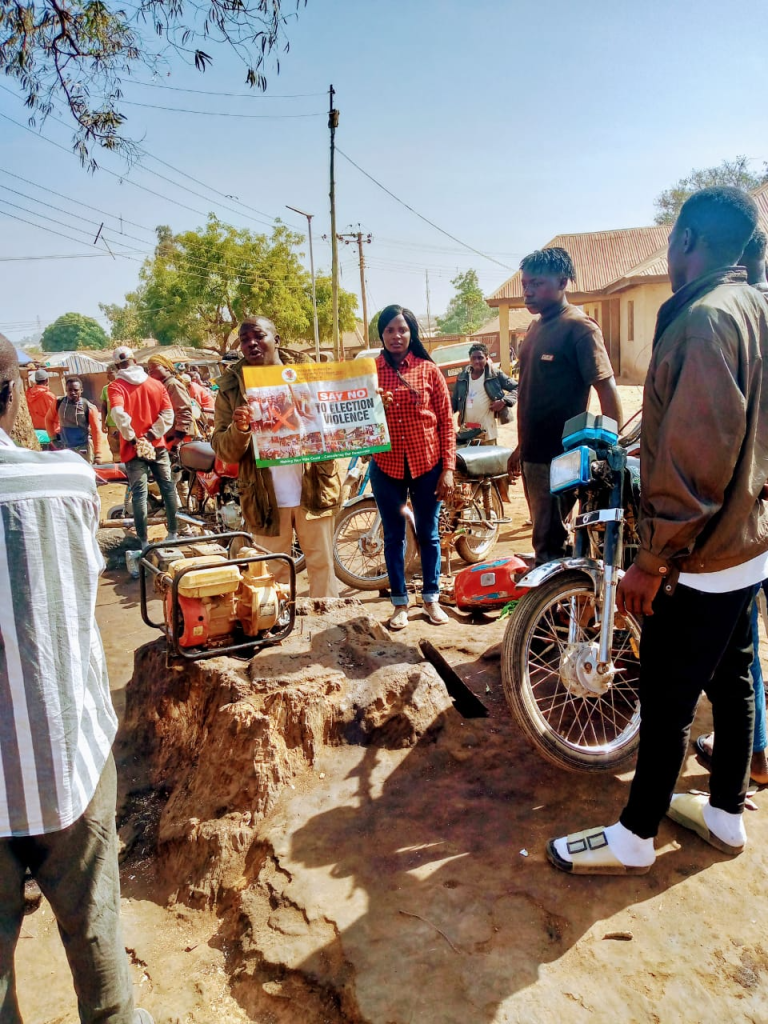
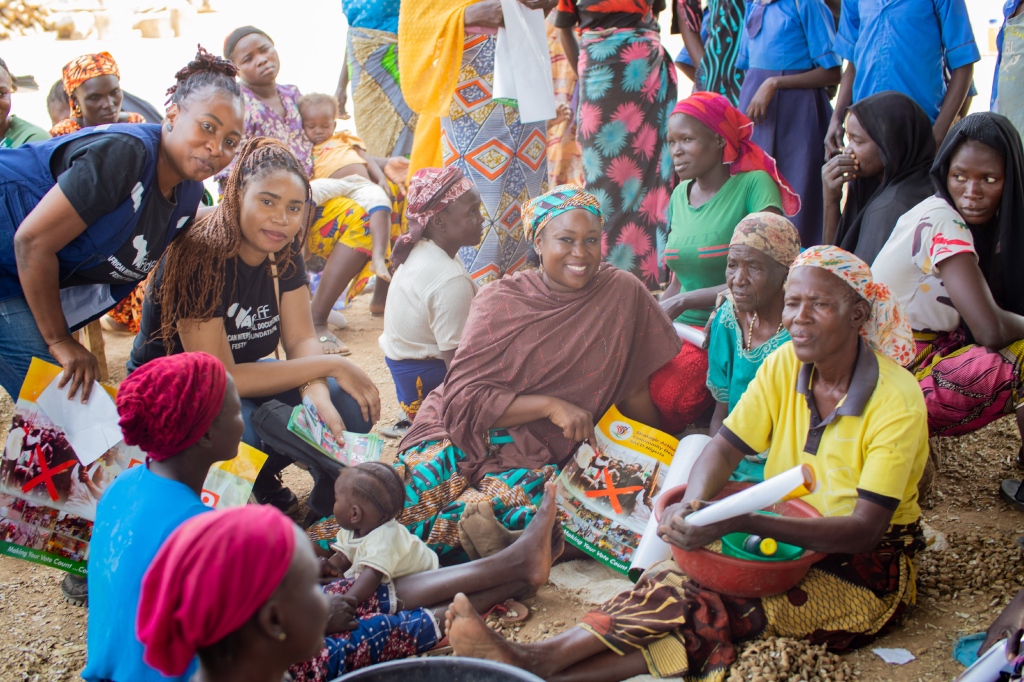
Electoral violence involves all forms of organized acts of threats aimed at intimidating, harming, or blackmailing a political stakeholder or opponent before, during, and after an election to determine, delay or influence a political process.
The consequences of election-related violence can be severe and far-reaching, affecting not just the immediate victims but also the wider community. In the past, such violence has led to loss of lives, destruction of property, and displacement of families. It is therefore imperative that we take a strong stance against violence during elections and work towards maintaining peace in our community.
As responsible citizens, we have a duty to ensure that the electoral process is peaceful, free and fair. This means saying no to violence in all its forms, whether it is physical, verbal or emotional. We must reject any attempts to use violence or intimidation to influence the outcome of elections. Instead, we should encourage peaceful dialogue and constructive engagement to resolve any disagreements or disputes.
It is important to remember that violence during elections does not just affect the candidates or political parties involved. It affects all of us, regardless of our political affiliation or beliefs. It disrupts our daily lives, undermines our security and hinders our economic progress. Therefore, we must all work together to prevent violence during elections and promote a culture of peace in our community.
We encouraged our people to say “no to violence” during the upcoming elections in Nigeria. Let us work towards maintaining peace and ensuring that everyone can exercise their democratic rights without fear or intimidation. Together, we can build a better future for ourselves and our children, one that is based on peace, harmony and respect for one another.
The Sensitization against Electoral Violence was carried out by Strategic Action for Community Development (SACD)-Nigeria in partnership with 30 members organizations who have embarked on advocacy, Awareness, and sensitization visits to some stakeholders in communities these include Community Leaders, Churches, youth groups, motor park union and radio jingles to eligible voters, creating awareness on violent free pre and post-election Sensitization and awareness became necessary considering the violent experience in the past and strong indicators of possible violence in the current election. These exercises cover approximately 210 communities across Nigeria. The various groups enlightens the voters to say no to election violence, and if anyone incited violence let neutralize and stop the person as violent will end up making their entire votes canceled and their decision will not be counted.
Also, the voters were sensitized on the need to shun vote buying/selling, collecting money from politicians to vote for them influences the choice of decisions giving room for manipulations. Our team sensitizes them on the need not to carry weapons to the polling unit and not to burn down any Independent National Electoral Commission (INEC) facility or structure rather in case of any grievances; there are better ways of channeling them. Most of the voters sensitized were made ambassadors to help extend the awareness to their homes and institutions and followers.
Some of the few Pictures captions below were during the sensitization creating more awareness among voters on the need to shun election violence, and bribes rather they should embrace peaceful poll conduct by obeying protocols at the poll.
Objectives
Our Objective is to sensitize the youths and discourage them against all forms of violence to achieve a peaceful 2023 elections and educate communities about the importance of voting as one part of their civic rights and motivate communities to turn out to vote on Election Day. To create awareness among voters and candidates on the dangers of election violence and the need to promote peaceful elections.
- To educate citizens on the importance of their vote and the impact it can have on the development of their community and the nation as a whole.
- To mobilize youth groups, women groups, community leaders, and other stakeholders to participate in the campaign against election violence.
- To build the capacity of election observers, journalists, and other stakeholders to monitor and report cases of election violence.
- To work with law enforcement agencies to ensure that perpetrators of election violence are brought to justice and to prevent the recurrence of such incidents.
- To encourage candidates and political parties to commit to peaceful campaigns and to sign a pledge to denounce and prevent election violence.
- To promote peacebuilding and conflict resolution mechanisms before, during, and after elections, such as dialogue and mediation, to prevent election-related violence.
Main Factors That Trigger Election Violence In Nigeria.
Youth
According to the Independent National Electoral Commission (INEC) as of January 2023, about 48 million (51%) out of the 93.5 million eligible voters are youths. Furthermore as stated by INEC out of the 9,518,756 valid newly registered voters between June 28, 2021 and July 31, 2022, those aged between 18 and 34 years of age were 7,286,871 representing 76.56%.
Most political parties rely heavily on the youth constituency in its campaign to achieve their 2023 objective
The role of the youth in electoral activities cannot be overemphasized. They play an active role in mobilizing support for candidates and actual voting. They are active participants in election violence and also active users of social media.
Social media
Social media has become a prominent and powerful forum for voter enlightenment, political activism, and the fastest means of information dissemination.
The use of social media as a formidable force for social engineering and political electioneering has continued to grow. The technology is participatory, interactive, and cost-effective, this has made it the medium of the moment as far as political communication and participation is concerned.
Four key stakeholders in the electoral process INEC, Politicians/Political parties, the Electorate, and Civil Society Organizations make extensive use of Social Media.
The proper usage of social media for national development cannot be overemphasized. The need for proper reportage and verification of information posted is of great concern here, since the youths are the highest users of social media. Violence is easily incited by unverified information spread on social media.
Religious and ethnic-regional tensions
Compounding the situation are long-standing religious and ethnic-regional tensions that make elections the battleground for political supremacy and resource control among Nigeria’s midst of ethnic groups. As a campaign strategy, candidates have often used inflammatory rhetoric between rival groups and Christians and Muslims to stake violence.
Traditional and religious leaders
Violence against women is rooted in the prevailing patriarchal culture of anti-female discriminatory norms and practices. The poor participation of women in elections stems from the strong ideology of gender bias as heavily embedded in tradition and religion.
The advocacy and awareness of no-election violence took our organization to the traditional and religious leaders who were charged to be active agents of change in their various communities and to bring about the abandonment of harmful traditional practices.
Poor management of the security apparatus in election violence
At the same time, the laws governing Nigeria’s security and law enforcement institutions implicitly permit political control over them. All these make the political climate in Nigeria very volatile which could spring up a humanitarian crisis that could be avoided by looking at the large chronic poverty in the country.
The various communities were sensitized on security awareness and how to manage security incidents in the election process.
Activities Carried Out in Brief
Violence during elections can have severe consequences, including loss of life and property damage. Therefore, it is crucial to promote non-violence and peaceful participation during elections. Here are three activities that can help achieve this goal:
Education and Awareness: Educating people about the negative impact of violence on the electoral process and its aftermath is an essential step in promoting non-violence during elections. Such education can be carried out through various means, including seminars, workshops, public lectures, and social media campaigns. People need to understand that violence undermines democracy and the legitimacy of the electoral process.
Community Mobilization: Community mobilization is an effective way to promote peaceful participation during elections. This can involve working with local community leaders, religious leaders, and youth groups to promote non-violence and peaceful coexistence. Engaging the community in the electoral process can also help promote peaceful participation.
Early Warning and Response Systems: Early warning and response systems are an effective tool for preventing election-related violence. These systems can involve working with local law enforcement agencies, civil society organizations, and community leaders to identify potential sources of violence and take proactive measures to prevent them. This can include the establishment of hotlines and the deployment of peace monitors to potential flashpoints.
In conclusion, promoting non-violence during elections requires a multifaceted approach that involves education, community mobilization, and the establishment of early warning and response systems. By taking these steps, we can help ensure that elections are peaceful, free, and fair, and that the will of the people is reflected in the electoral outcomes.
Outcomes
- The people reached were demonstrated how to peacefully conduct themselves in a poll line and cast their votes, our team also demonstrated to them who to consider even when they are not in the queue to avoid kayos, these include persons leaving with disabilities (physical challenge), the aged, heavily pregnant women.
- They were also shown how their votes stand canceled in case of any violence recorded, and also the tricks used by desperate politicians who wants to be in power at all course by using thugs to stumps polling units to cause kayos, the electorate were shown how to collectively defend their votes from thugs invasion.
- Our outcome (SACDN) during a “Say No to Violence” campaign significantly decreases incidents of violence, as well as an increase in awareness and understanding about the impact of violence on individuals and communities.
- For example, the campaign focuses on educating people about domestic violence, a good outcome was significantly realized in a rising number of people seeking help or reporting abuse to the appropriate authorities. Another good outcome was the establishment of community support groups to look after victims of violence.
- Additionally, we succeeded in our campaign as a result of the policy changes and to increased funding for programs that support victims of violence, or for education and prevention efforts. Ultimately, the goal of the campaign is to create a safer and more peaceful society for everyone.
Successes/Impact
- Over 1 million people were reached physically across more than 100 communities in Nigeria. While over 10 million were reached through television, radio jiggles, the participants understood what electoral violence is and the triggers of electoral violence.
- Election violence was reduced by 40% compared to our last elections.
- Communities realized that it is important to stay peaceful at all costs before, during, and after the election.
- Communities understood that the use of arms and engaging in violence can stop and prevent the development of a place/country.
- The turnout was impressive various people from all the communities were in attendance. Communities understood that the use of arms and engaging in violence can stop and prevent the development of a place/country.
- The Communities understood better that vote buying is a crime and should not be accepted by any one of them.
Challenges
1. The limited amount of resources truncated the proper dissemination of information via pamphlets and other mediums. The community members each wanted a copy of the fliers which were insufficient.
2. Insufficient Funds. We were unable to effectively carry out the sensitization due to the lack of sufficient manpower which was because of the lack of cash circulating.
Recommendations And Conclusion:
Indeed, the 2023 general elections re-ignited the hopes of many Nigerians who believe in the enormous potential of the country as a leader in Africa. To ensure the institutionalization of true democracy in Nigeria, the brief summarized report has come up with recommendations.
- Firstly, the government at all levels should ensure that electoral offenders before, during, and after the elections are arrested and made to face a court of law. This will serve as deterrence to the financiers and foot soldiers that use violence to promote their political objectives.
- Secondly, Nigeria must improve its existing security apparatuses to combat the dynamic and sophisticated 21st-century security challenges. Recruitment of security personnel ought to be based on merit. Government should ensure that the funds made available to the security agencies are judiciously utilized for the acquisition of skills and the procurement of up-to-date equipment.
- Thirdly, the Government should form a platform that will accommodate all stakeholders such as the politicians, the media, civil society organizations, and religious institutions at the local, state, and national levels to sensitize and re-orientate Nigerians on peaceful co-existence and the consequences of electoral violence. This enlightenment program should be sustained to help Nigerians inculcate democratic norms and values.
- Finally, strict adherence to the Electoral Act 2022 must be observed to ensure electoral credibility in Nigeria.


